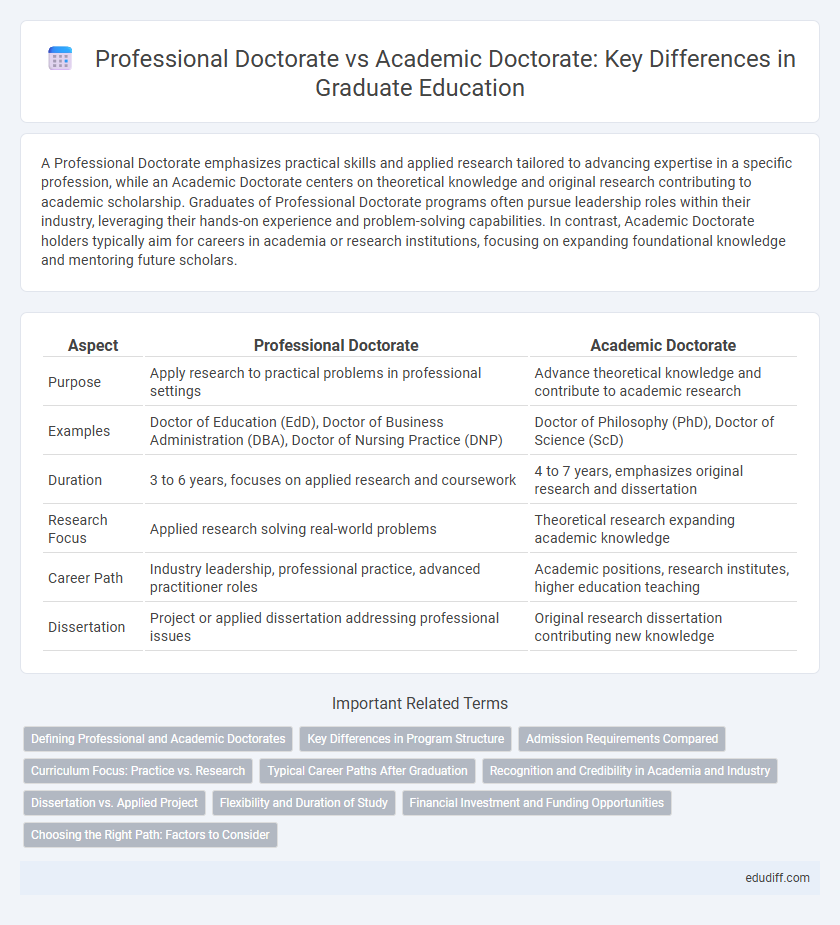A Professional Doctorate emphasizes practical skills and applied research tailored to advancing expertise in a specific profession, while an Academic Doctorate centers on theoretical knowledge and original research contributing to academic scholarship. Graduates of Professional Doctorate programs often pursue leadership roles within their industry, leveraging their hands-on experience and problem-solving capabilities. In contrast, Academic Doctorate holders typically aim for careers in academia or research institutions, focusing on expanding foundational knowledge and mentoring future scholars.
Table of Comparison
| Aspect | Professional Doctorate | Academic Doctorate |
|---|---|---|
| Purpose | Apply research to practical problems in professional settings | Advance theoretical knowledge and contribute to academic research |
| Examples | Doctor of Education (EdD), Doctor of Business Administration (DBA), Doctor of Nursing Practice (DNP) | Doctor of Philosophy (PhD), Doctor of Science (ScD) |
| Duration | 3 to 6 years, focuses on applied research and coursework | 4 to 7 years, emphasizes original research and dissertation |
| Research Focus | Applied research solving real-world problems | Theoretical research expanding academic knowledge |
| Career Path | Industry leadership, professional practice, advanced practitioner roles | Academic positions, research institutes, higher education teaching |
| Dissertation | Project or applied dissertation addressing professional issues | Original research dissertation contributing new knowledge |
Defining Professional and Academic Doctorates
Professional doctorates, such as the Doctor of Business Administration (DBA) or Doctor of Education (EdD), emphasize applied research and practical skills tailored to specific industries and professions. Academic doctorates, like the PhD, focus on original theoretical research intended to contribute new knowledge to a discipline. Both degrees demonstrate advanced expertise, but professional doctorates prioritize real-world problem solving, whereas academic doctorates prioritize scholarly inquiry.
Key Differences in Program Structure
Professional doctorates prioritize practical application and often include internships or fieldwork, emphasizing skills needed for specific professions. Academic doctorates focus on original research, requiring a dissertation that contributes new knowledge to the field. Program duration for professional doctorates tends to be shorter, while academic doctorates involve extensive research and longer completion times.
Admission Requirements Compared
Professional doctorate programs typically require applicants to have significant professional experience in their field alongside a relevant master's degree, emphasizing practical expertise and career achievements. Academic doctorate programs prioritize strong academic records, research experience, and often require a thesis proposal or evidence of scholarly potential, usually following completion of a master's degree in a related discipline. Both pathways demand rigorous admission standards, but professional doctorates lean towards applied experience while academic doctorates focus on research credentials and scholarly aptitude.
Curriculum Focus: Practice vs. Research
Professional doctorates emphasize applied practice and the direct implementation of knowledge in professional settings, preparing graduates for leadership roles within their fields. Academic doctorates prioritize original research, contributing new theoretical insights and advancing scholarly understanding through extensive investigation. Curriculum designs for professional doctorates integrate practical projects and fieldwork, whereas academic doctorates focus on dissertation research and theoretical coursework.
Typical Career Paths After Graduation
Professional doctorate graduates typically pursue leadership roles in industry, healthcare, education, or specialized professional practice, emphasizing applied expertise and practical skills. Academic doctorate holders often aim for careers in research, university faculty positions, or advanced scholarly work that involves producing original research and contributing to theoretical knowledge. Both pathways offer opportunities for consulting, policy development, and higher education administration, but differ in focus between applied professional practice and academic research.
Recognition and Credibility in Academia and Industry
Professional doctorate degrees, such as the Doctor of Business Administration (DBA) or Doctor of Education (EdD), emphasize applied expertise and industry relevance, often gaining strong recognition in professional sectors for practical impact. Academic doctorates, including the PhD, are primarily research-focused, carrying high credibility in academic institutions due to their contribution to theoretical knowledge and original research. Recognition in academia leans heavily towards PhDs for tenure and research roles, while professional doctorates are increasingly valued in industry and practice-driven academic programs.
Dissertation vs. Applied Project
A Professional Doctorate emphasizes applied projects that solve real-world problems in industry or practice, whereas an Academic Doctorate centers on a dissertation contributing original research to theoretical knowledge. The applied project in Professional Doctorates integrates practical experience with scholarly inquiry, often resulting in tangible outcomes for organizations or communities. In contrast, the dissertation for Academic Doctorates demands rigorous methodological investigation to advance disciplinary frameworks and academic literature.
Flexibility and Duration of Study
Professional doctorates offer greater flexibility with part-time, online, and evening study options, catering to working professionals aiming to balance career and education. Academic doctorates typically require full-time, campus-based commitment with a longer duration, often spanning 4-7 years focused on extensive research. The shorter, more adaptable structure of professional doctorates usually takes around 3-6 years to complete, prioritizing applied practice over theoretical exploration.
Financial Investment and Funding Opportunities
Professional doctorates often require lower financial investment due to shorter program duration and higher likelihood of employer sponsorship or industry funding. Academic doctorates typically demand greater financial resources, including longer time commitments and reliance on research grants or university scholarships. Funding opportunities for professional doctorates are frequently tied to practical experience and applied research, whereas academic doctorates benefit from extensive grant programs supporting theoretical investigation.
Choosing the Right Path: Factors to Consider
Factors to consider when choosing between a Professional Doctorate and an Academic Doctorate include career goals, research interests, and industry demands. Professional Doctorates such as the Doctor of Education (EdD) or Doctor of Business Administration (DBA) emphasize practical application and advanced professional skills, ideal for leadership roles and industry practice. Academic Doctorates like the Doctor of Philosophy (PhD) focus on original research and theoretical knowledge, suitable for careers in academia, research institutions, and scholarly publishing.
Professional Doctorate vs Academic Doctorate Infographic

 edudiff.com
edudiff.com